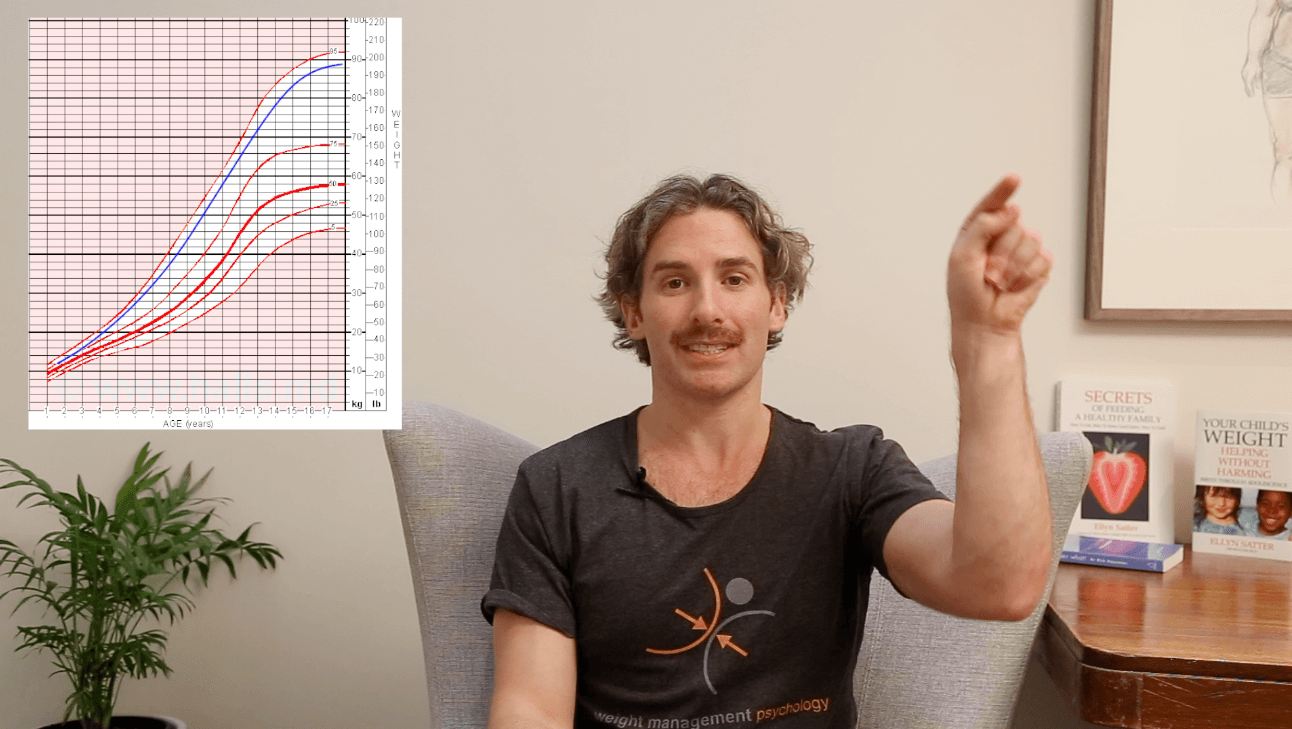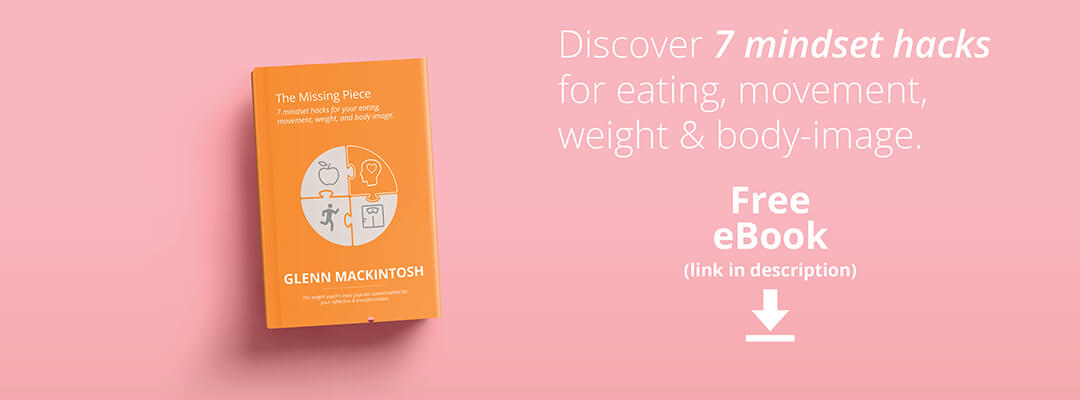
If you’re worried about your own weight and have children, chances are you are worried about their weight too. You know forcing them to lose weight probably won’t work and trying to make them eat healthier can make them dig their heels in even further! So how do you help your child develop healthy eating habits and manage their weight without doing any harm? In this Thursday Therapy Glenn gives you some ideas to for navigating this tricky and often frustrating challenge for parents and caregivers.
Watch Video
I created this video for people just like you.
If you found it valuable, please help me share it with them!
Links from Video:
Donate to Glenn’s Movember Campaign
Ellyn Satter Institute
Poodle Science Video
SHOW NOTES
- Psychologist question on working with a mum who’s daughter is “getting chubby”. [2:55]
- Restrictive feeding practices. [3:54]
- Question from a mum about guiding her children towards a healthy lifestyle. [6:07]
- Question from a mum who had a letter from her son’s school about his weight. [8:29]
- Children’s weight/height percentile and height/weight charts. [9:51]
- The Satter Division of Responsibility. [11:48]
- “Intuitive Eating for Children”. [12:48]
- Parting thoughts on children and eating. [14:12]
TRANSCRIPT
Welcome to Thursday Therapy. You might be wondering why I’m rocking this moustache, and I’m doing Movember. I think it’s a great initiative for men’s mental health, it’s a topic that’s very important to me. Three out of four suicides are men, and the world loses 510,000 men a year to mental health issues, so I think it’s a really important cause. I’d just like to say that if you are a man, it’s not weak to express your emotions, it’s not weak to get help.
I, this year, started seeing a psychologist, and as a lot of people do when they see a psychologist, you get this feeling like, “Shouldn’t I be just taking care of this myself?” Or, it’s a little bit embarrassing, but it’s always a great thing to do. I know that most of the people that watch Thursday Therapy are women, so if there are men close to you, a partner, or a husband, or a brother, it never hurts to reach out to them and say, “How are you doing?” Let them feel like whatever the answer is, that’s okay.
I’m also raising funds, I’ve got a small goal to raise some funds for Movember, so we’ll provide the details for that. I don’t often ask for much from you guys, but if you’ve got a bit of spare money that you’d like to donate to it, it feels good to give as well.
So today I’m going to answer a few related questions on how to help and how not to harm your child’s weight, because I get these all the time. Now if you’re worried about your kid’s eating or eight, now this might be a journey that you have to walk a little further down the road. So what I’m going to do is I’m going to give you some good ideas to start you off, and then I’m going to direct you to the Ellyn Satter Institute. Ellyn is one of my mentors, and she’s widely regarded as the world’s leading expert on parental feeding and weight practises so I’m going to direct you there. She’s got a whole lot of great information on her website, some downloadable stuff, and even some great books that can really help you.
The first question comes from Amanda, who asks, “I’m a psychologist and I have a mom I’m working with who perceives her child to be getting chubby. The child doesn’t look to be to me. I’ve been reading about the strong predictor of mum’s perception of the child having a weight problem in primary years, and later obesity, so this was ringing warning bells for me. Do you have any advice for me working with this mom?”
Great question Amanda, and absolutely I have an answer. So just like with adults, we want to assume that the kid’s body is an amazing self-regulator, so it knows what to do. If we look at children’s eating and their variance in what they eat from meal to meal, it’s really big. So any parent will notice sometimes the kid just keeps eating, and you’re thinking, “Has this kid got hollow legs?” Other times you think, “Well this child should be hungry,” but they’re just not interested in food.
Now naturally, parents who are worried about their children’s weight, they tend to really worry about this. They put in place what we call restrictive feeding practises. So sometimes these restrictive feeding practises can be pretty extreme, but other times they’re just some of those more day-to-day things that we do to try and regulate our kid’s eating.
So examples of that are limiting the amount of food that the kid can eat; closely monitoring the food that the child’s eating; or restricting certain foods, whether it’s just not allowing that child to eat the food or not having the food in the house because you don’t want the child to eat it.
Now while they make intuitive sense, restrictive feeding practises tend to backfire. That’s because they get the child out of touch with their natural signs to start and stop, their own hunger informers. Now when this happens, when the child does then have an opportunity to overeat, they will take it with both hands and they’ll often really overeat quite a lot, even when they’re not hungry. So we don’t want to stuff up that natural intuition that the child has, especially because we don’t need to.
So when we look at day-to-day variance in kid’s eating, and how much calories they take in if they’re allow to eat freely over the course of a week, the variance is only about 10% or so. So what this means is that children can naturally regulate their own calorie intake just by using their internal signals.
So the first piece of advice would be to do something that I know for parents is very hard, especially if you’re worried about your child’s weight and eating, is to let go of the agenda to control what they eat. To begin to trust them and trust that over time, that will allow them the ability to learn to trust themselves with their eating.
The next question comes from Tam, who asks, “How do we, as overweight parents with overweight children, head our children in the right direction to live a better lifestyle without stigmatising weight or size? Do we just have to let them make their own choices and hope they click earlier than we did?”
“I had a son who is overweight. He doesn’t exercise and makes no-so-healthy food choices. I don’t want him to go through what I’ve been through physically and mentally. I know I haven’t made the best food/lifestyle choices throughout my life, but with your help I’m getting better and accepting me for the me that I am at the moment. Hope you can make sense of this.”
This is a really common question Tammy, so thank you for asking it. What we know is unfortunately parents can pass their weight worries onto their children. Now the strongest relationship is from mother to daughter, but it does happen across all the genders as well.
Now, what tends to happen is that, especially if the mom is concerned with her own weight, she then becomes overly concerned with her child’s weight and then that child in turn becomes overly concerned with their weight. Now typically if that child has had those restrictive feeding practises, they tend to gain a little bit more weight than the average child and they worry about that even more. Then as adults they go on to put themselves on their own diets, which are really just adult restrictive feeding practises, and continue to gain more weight. So this is really important to address.
But you said something really important in their, is that through working with us, which is really cool, you’re developing different attitudes towards intuitive eating, enjoyable movement, body acceptance. I actually think that that’s the most powerful thing that you can do for your child’s attitudes, is to keep working on your own attitudes.
Unfortunately, even if you do something and try not to directly regulate your child’s eating, or try not to directly talk them about their weight, them understanding and sensing what you are doing, even in very subtle and subconscious ways, it will often sneak through and permeate their thinking over time. So I actually think that the best thing that you can do is keep working on your own attitudes, and trust that that will just subconsciously sink in over time.
The last question comes from Jess, who asks, “Hey Glenn, have been binge watching your videos and I love them. Is there any way you could talk about intuitive eating whilst being a mommy to a toddler, and a main meal cooker for my fiancée too? I’d like to introduce them to the concepts of intuitive eating but I also have to pack them lunches and snacks, and make breakfast and dinners for everyone, so we tend to eat the same as each other.”
“My son has just had a letter home from school about his weight. He’s only four and he eats a lot of fruits and vegetables and is very active, but I’d like to reign it in a bit and have him eating from hunger, not boredom. It’s very hard to say no when he wants to snack on a carrot or an apple.”
Thank you for your question Jess, and I can’t believe your child got a letter about their weight at four years old. This makes me really sad for you, and also really frustrated because we know that these messages can cause all sorts of problems, not only for psychological wellbeing, but also all sorts of weight and eating issues.
The first thing I want you to think about is we don’t want to try to regulate your child’s weight, and I want to give you a couple of ideas on that. The thing is, just like with adults, children have their own natural weight that they’re supposed to be and become over the course of their life. So even if your child is at a high percentile of weight for height, the aim should really be to keep them on that percentile.
Of course, if they overeat a lot for a long period of time they might go up to a higher percentile and we don’t want that, but the converse is true. If we try and get them down to a lower percentile than their body’s designed to be on, then what we find is that quite reliably after that they can shoot back up, or even to a higher percentile.
So if we think about your body again being this amazing self-regulator, and we think of dieting as prescribed under eating, then if you under feed your child to get them to a lower percentile, then what’s going to happen is your body’s going to do exactly what it should do, and it’s going to gain a little bit more weight in response to that under eating. So we want to keep your child on its own natural height for weight chart.
A metaphor that I quite like, although it is kind of crude, is to think of your kids like dogs. Some of them are little pretty Toy Poodles, other ones are energetic Labradors, others still are beautiful, big Great Danes. If you try and get your Labrador to eat like a Toy Poodle, or if you try and get your Great Dane to weigh what a Toy Poodle weighs, you’re going to run into problems because they’re working against their nature. So you might think about it like what type of kid do I have here, and try to help them be the best version of themselves that they can be.
So you may have noticed that I haven’t given you too much on the mechanics of actually supporting your children to better eating. I’ve talked about what not to do, I’ve talked about how you support yourself, and I’ve talked about mindsets. But when it comes to the mechanics, I want to refer you to Ellyn Satter’s Satter: Division of Responsibility.
It’s a little bit different for kids of different ages, from infants through to adolescents, so I’m going to direct you to the website, but the basic gist of it is that parents provide the opportunities for good food choices. When I say good food choices I don’t mean only healthy food, but for children to eat a variety of foods and learn how to eat well. Then children decide how much they’re going to eat and whether they’re going to eat.
So that’s the general rule is that parents provide, children decide, but there is a lot to this as you can understand. So I really want you to go and check out Ellyn Satter’s work if this applies to you.
In the meantime though, it is very comforting for some of you who have been with me for a while to know that it is really intuitive eating for children. So if you get stuck, you can just think, “Same rules apply. What would I say to myself?” So say for example if you’ve got your child wants to eat some ice cream or lollies, and you don’t necessarily know that it’s a good idea. Rather than saying, “I’m going to employ a restrictive feeding practise and say, ‘No, you can’t eat that because that’ll make you gain weight,'” you might question, “Hey, is this belly hungry, or is this mouth hungry, or is this head boredom hungry?” Just slowly help the child understand what’s going on behind their eating so they can make better choices.
But a couple of things there, definitely have a look at Ellyn Satter’s Division of Responsibility, there’s a really deep round hole that you can go through there. It’ll help you with all the tricky parts of this, which I’m sure your brain is already starting to come up with. But for now, same rules apply whether we’re adults or kids. It’s about embracing that we’re all different shapes and sizes, learning to eat according to our own body cues, and learning to move in a way that our bodies enjoy.
So guys, thanks for being with me today. Similar to when I’m working with adults, learning these new ideas can be a bit tricky at times, so have a bit of patience and compassion for yourself, and at the same time open your mind to a new way. Because like when I’m working with adults, if you’re working with your kids and it’s not working, then something fundamental probably has to change.
We’d definitely love to continue this conversation, so please, wherever you’re watching this, send us a comment, flick us an email back. Of course, if you haven’t already subscribed, you need to subscribe to Thursday Therapy for regular videos on the psychology of your eating, movement, weight and body image. So enjoy having a play around with these ideas, myself and definitely the team at the Ellyn Satter Institute will be there to support you, and I’ll see you at next Thursday Therapy.





